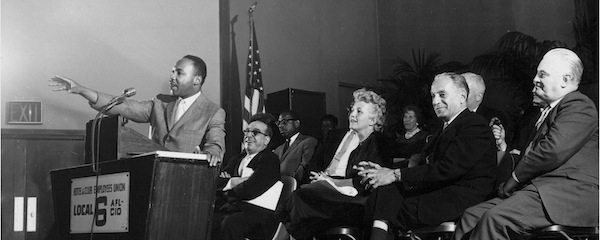Remembering the Reverend Martin Luther King, Jr.

As the U.S. observes this week the annual holiday in honor of the life of the Reverend Martin Luther King, Jr., we should not forget the ties between Dr. King and labor unions. In fact, when Dr. King was assassinated in Memphis, Tennessee in 1968, he was in that city in support of striking members of the sanitation workers’ union.
The ties between Dr. King and organized labor are well documented. U.S. labor unions—including our own—joined with Dr. King in pushing for enactment of the Civil Rights Act of 1964 and the Voting Rights Act of 1965.
Our union was proud to work with Dr. King. Both Local 6 and the Hotel Trades Council provided him and his movement with financial contributions and other resources beginning with his earliest days at the Southern Christian Leadership Conference. And all of us can be proud of the facts that Dr. King twice received Local 6’s Civil Rights Award and that the Hotel Trades Council was the first union in the nation to negotiate a paid holiday for its members in observance of his memory.
As we observe the Reverend Martin Luther King Jr.’s birth and the accomplishments of his life, it is appropriate to recall the beauty of his vision and the eloquence with which he advocated it. Here is one example. Speaking about American life in the later part of the 19th Century and the earlier part of the 20th Century, Dr. King noted that workers in those times had no rights and no respect, saying, “They lived a life that was socially submerged and barren.” Dr. King then added, in words powerful enough to resonate today, “The inspiring answer to this intolerable and dehumanizing existence was economic organization through trade unions."
Dr. King also recognized that unions played a crucial role in advancing workers of all races, creeds and ethnicities. He said, “African Americans read the history of labor and find it mirrors our own existence. We know that if we are not simultaneously organizing our strength we have no means to move forward.”
Reverend King later took that thought a step further, saying that any attack on unions was an attack on everyone “Our needs are identical with organized labor's needs—decent wages, fair working conditions, livable housing, old age security, and conditions in which families can grow, have education for our children and respect in our community. The duality of interests of labor and ourselves makes any crisis which lacerates unions a crisis from which we, too, bleed.”
There are other areas besides civil rights where Dr. King’s opinions were groundbreaking and inspiring. In 1965 he began to publicly express doubts about the Vietnam War. Two years later, in an April 4, 1967 appearance here in New York City, he spoke out strongly against our country’s involvement in the war. He even associated the war with economic injustice, arguing that the country needed serious moral change: "A nation that continues year after year to spend more money on military defense than on programs of social uplift is approaching spiritual death," Dr. King said.
By 1967 the work of the Reverend Martin Luther King Jr. and other civil rights leaders had led to the Civil Rights Act and the Voting Rights Act, two historic pieces of legislation that improved our country immensely. Dr. King then concentrated on fighting for the working poor in the U.S. Our Union participated in his Poor People’s Campaign, busing members to Washington D.C. to join in the legendary demonstrations associated with that drive. Although different phrasing was used at the time, the purpose of the Poor People’s Campaign was to draw attention to the gross income disparity in the United States; in other words, the growing wealth of the 1 percent at the expense of the 99 percent.
Recalling the life of Dr. King reminds us that our union’s fight for social justice is as old as the Hotel Trades Council itself. Here is a look back at this 76-year-old continuing story.
And you will find an historic look at our union’s involvement with the civil rights movement here.
Considering that we are a country that is still struggling with income inequality, where women earn 25 percent less than men in the same jobs, where unions are under attack in states like Michigan, Indiana and Ohio, where massive defense spending continues to take away money from domestic programs to help the poor, the elderly and the sick, and where 12 million undocumented workers live in fear in the shadows of the American mainstream, we should all remember that the greatest tribute we can pay to Dr. King’s memory is to maintain his dream and carry on his work.


